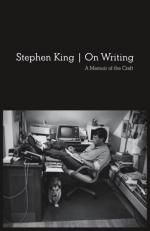
|
| Name: _________________________ | Period: ___________________ |
This test consists of 15 multiple choice questions and 5 short answer questions.
Multiple Choice Questions
1. What is King's first piece of advice to those reading the chapter, On Writing?
(a) To read.
(b) To believe in their work.
(c) To practice their writing using his suggestions.
(d) To write every day.
2. There is an old adage in writing: write what you know. How does King feel about this?
(a) He believes that writers should follow this advice, but not in a literal way.
(b) He hopes that writers will experiment and not be limited by this statement.
(c) He urges writers to ignore this advice and write what they think is important and of value.
(d) He suggests writers research questions they are interested in and then write about them.
3. What does King believe is necessary to create strong characters?
(a) They should be clearly defined by their actions.
(b) They should be clearly defined but interesting.
(c) The reader should have no problem identifying the good characters from the bad ones.
(d) They should be multidimensional.
4. Which genre does King feel Misery will belong to when he begins to write the story?
(a) A novella.
(b) A short story.
(c) A novel.
(d) A screenplay.
5. What is unusual about the character Annie Wilkes?
(a) She is a psychopath with redeeming qualities.
(b) She is a good person doing evil deeds.
(c) She maintains her good qualities while committing her sins.
(d) Her prisoner finds her sympathetic.
6. In addition to his injunction, King wants writers to leave something behind when they write. What should writers leave behind?
(a) Their desires.
(b) Honesty.
(c) Cleverness.
(d) Fear.
7. Why does King take this position on adverbs?
(a) He feels adverbs are a crutch for the writer.
(b) He feels adverbs do the thinking for the reader.
(c) He wants to limit the words in his books.
(d) He believes that by using adverbs, a writer won't stretch his imagination.
8. According to King, what characteristics should all characters possess?
(a) Characteristics which make them seem perfect.
(b) Evil characteristics as well as good ones.
(c) Endearing qualities.
(d) Characteristics that make the reader sympathetic.
9. Why does King's uncle carry the whole toolbox with him?
(a) Because it is a habit.
(b) Because he can't go back home between jobs.
(c) Because lifting it gives him a workout.
(d) Because he says a person could never be sure what tools he would need.
10. What advice does King give on paragraphs?
(a) To pay attention to the length and number of paragraphs.
(b) King feels paragraphs should have a standard length of 8 to 10 lines.
(c) King believes paragraphs should not vary in length.
(d) King wants writers to see their paragraphs as a graphic picture on a page.
11. What does King consider to be the best tool in making a writer?
(a) Taking writing courses in different genres.
(b) Practice writing.
(c) Going to writers' retreats.
(d) Reading.
12. What does King consider to be a writer's practice?
(a) Writing exercises.
(b) Reading.
(c) Any kind of writing.
(d) Daily journal entries.
13. What action does King believe a writer should take with respect to grammar?
(a) To ask teachers about things which confuse the writer.
(b) To thoroughly read a well-known grammar text.
(c) To ignore grammar and let editors correct any obvious mistakes.
(d) To research the writer's specific doubts on the Internet.
14. What does King's uncle inherit?
(a) A silver watch.
(b) The house.
(c) A car.
(d) A large toolbox.
15. King's comparison of a handyman's toolbox with a writer's tool box is which figure of speech?
(a) Epigram.
(b) Simile.
(c) Irony.
(d) Metaphor.
Short Answer Questions
1. If used correctly, King believes that dialogue could be what object for a writer?
2. How does King use this advice from his uncle?
3. Why does King feel that plotting out a novel is not wise?
4. What kind of verbs does King recommend be used when writing?
5. In the chapter, Toolbox, what advice does King give the reader?
|
This section contains 767 words (approx. 3 pages at 300 words per page) |

|




